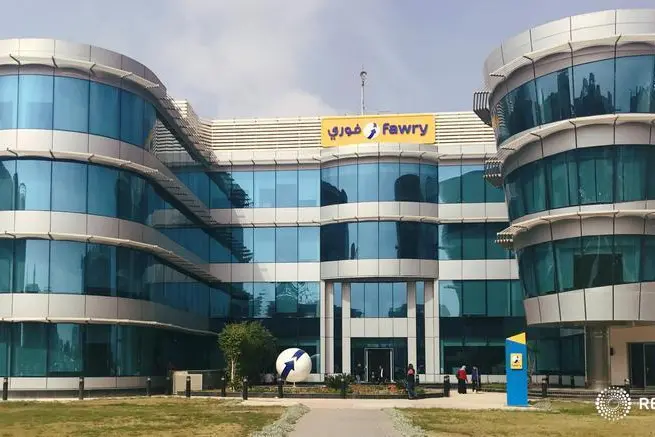PHOTO
More than two-thirds of Egypt’s adult population do not have a bank account, and even those who do rarely have full access to financial services. At the other extreme, mobile phone penetration in the country is estimated at over 95 percent, and the number of mobile internet users has reached more than 42 million. For Ashraf Sabry, CEO of e-payment unicorn Fawry, this is a huge business opportunity.
“I can say that we have around 15 million Egyptians that have bank accounts,” said Sabry in an interview with ZAWYA. “The reality is that those with banked accounts can be classified as under-banked because they are not offered the complete portfolio of financial services, and they are not using their bank accounts for electronic payments.”
Fawry is a publicly traded company with a majority share owned by local and regional banks. The company offers financial services to consumers and businesses by providing ways to pay bills and purchase goods and services using multiple channels: online, ATMs, mobile wallets and retail points. Last year, Fawry also launched an “e-shop builder” to assist businesses in establishing their own e-commerce platforms.
“A catalyst”
Fawry operates more than 166,000 service points nationwide, caters to 29 million monthly users and performs a total of three million transactions a day. In 2019, the company’s transaction volume reached EGP 53 billion ($3.37 billion).
“The current penetration of the services provided by Fawry is [still] very low, which reflects a sizable addressable market that Fawry is very well positioned to capture,” said Sabry.
Fawry, Sabry says, has been serving as “a catalyst” in Egypt’s ongoing transition to financial inclusion. “The appetite and willingness of the government and businesses to digitize their services is becoming more apparent, which will definitely have a positive impact on the potential for growth.”
“More than 22 banks are using our mobile platform, we have more than 90,000 merchants enabled to accept electronic payments, [and] our lending portfolio reached more than 200 million EGP in a very difficult time,” Sabry said. “We expect more to happen in 2021.”
Aversion to electronic financial service remains one of the challenges facing fintech in Egypt, an attitude that COVID-19 has helped mitigate, according to Sabry. Mobile wallet transactions, one of Fawry’s main services, witnessed “phenomenal growth” as soon as a partial lockdown was imposed. The company’s mobile app reached a record high of more than a million downloads between March and June.
Fawry was established in 2008 to introduce easy electronic payments in a country grappling with congested traffic, complex bureaucracy and a predominantly unbanked population. In 2015, a consortium of international and regional funds acquired a majority share at a purchase price of approximately $100 million. In August 2019, Fawry offered 36 percent of its share capital on the Egypt stock exchange market, worth $97 million then.
Since its initial public offering, the company’s stock price has increased more than threefold, which Sabry attributes to its ability to deliver on its declared KPIs to investors, namely “growth, revenue diversification and improvement in the operating margins.” He also cites the various legislations by the Central Bank of Egypt (CBE) to promote the adoption of electronic payments.
Aggressive growth
Last year, the CBE unveiled a strategy that recognized fintech as a crucial pillar to promote financial inclusion and transform the country’s banking landscape. “I believe that the CBE is putting a lot of focus on electronic payments, and more initiatives should be extended to offer customers microlending and micro-saving products. A cooperative model between banks and fintech in that space will boost financial inclusion,” Sabry said.
A Magnitt 2019 report showed that fintech startups accounted for the highest number of deals in Egypt. However, a CBE 2019 market survey said that investment disbursements in fintech by domestic VCs remain “marginal”.
Sabry believes that Egypt will attract more funds in fintech and that many talented Egyptians are willing to join the industry, which can only mean more successes. “Having said so,” he added, “many companies are trying to do the same thing, so we can expect either some consolidation or failures as well.”
Looking ahead, Fawry is planning “aggressive growth” in its customer base in addition to expansion of its mobile and B2B offerings as well as its lending services. “We have invested a lot in those platforms, and we believe 2021 will witness a considerable change in the diversity of our offerings.”
The company is also expected to launch its first project in the Gulf in the first quarter of 2021. In the meantime, Fawry is focused on “leveraging” its technology to enter new markets in Africa.
“We are optimistic about the future and will continue investing in mobility, acceptance and supply chain solutions,” Sabry said.
(Writing by Noha El Hennawy; editing by Seban Scaria seban.scaria@refinitiv.com )
Disclaimer: This article is provided for informational purposes only. The content does not provide tax, legal or investment advice or opinion regarding the suitability, value or profitability of any particular security, portfolio or investment strategy. Read our full disclaimer policy here.
© ZAWYA 2020





















